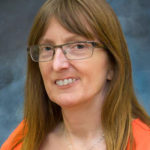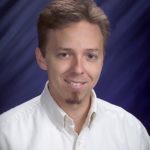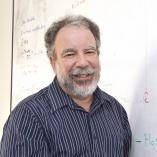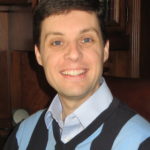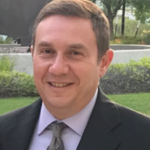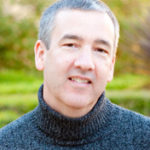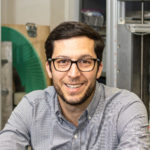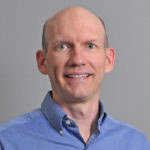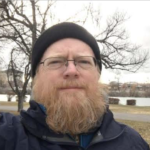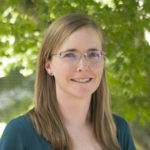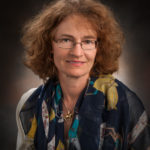Monday, March 29
|
Brookhaven National Laboratory |
|
Susan Pepper Susan Pepper received her bachelor and master’s degrees in civil engineering from the Massachusetts Institute of Technology, with an emphasis on structural and geotechnical engineering. A Brookhaven Lab employee since 1985, Pepper worked in the Department of Nuclear Energy’s Structural Analysis Division for eight years before joining NNS, where she served as liaison officer at the U.S. Mission to UN System Organizations in Vienna. |
Monday, March 29
|
Los Alamos National Laboratory |
| Los Alamos National Laboratory YouTube channel |
Emily Casleton Emily Casleton is the point of contact for the MTV from Los Alamos National Laboratory. She is a staff member in the Statistical Sciences Group and holds a PhD in statistics from Iowa State University. Emily’s main research focus is in multi-source data fusion, Bayesian non-parametrics, and Bayesian design of experiments, commonly applying these techniques to nuclear non-proliferation, safeguards, and underground explosion monitoring. She routinely collaborates with nuclear engineers, nuclear physicists, seismologists, computer scientists to solve interesting and challenging problems. |
Monday, March 29
|
Pacific Northwest National Laboratory |
|
Allen Seifert Allen Seifert joined Pacific Northwest National Laboratory in 2004 and is currently a Senior Research Scientist in the Detection Physics group. Dr. Seifert received his Ph.D. in Nuclear Engineering from the University of Michigan in 2004, with a doctoral thesis focusing on sub-micron x-ray tomography. At PNNL, he has led several MTV-related projects, including the PNNL LDRD Dual Mode Imaging project, the NA-22-funded Low-Intrusion Techniques and Sensitive Information Management for Warhead Counting and Verification project, and the Intrinsic Information Barriers for Imaging venture. Over the last ~15+ years, Dr. Seifert has done significant work in designing, constructing, characterizing, and optimizing the performance of PNNL’s Ultra-Low-Background Proportional Counters (ULBPCs), becoming a leading expert at PNNL in gas-proportional counters. Dr. Seifert has served as both a principle investigator and project manager across numerous projects involving the use of the ULBPCs, the design and construction of an ultra-low-background shielding/counting system built specifically for use with ULBPCs, and related applied research. |
Monday, March 29
|
Princeton Plasma Physics Laboratory |
| PPPL Verification Facility (PDF document) |
Robert Goldston Robert Goldston is a professor of Astrophysical Sciences at Princeton University and an international leader in the fields of plasma physics and magnetic fusion energy. From 1997 to 2009 he served as Director of PPPL. He is the author of 220 papers in journals and conference proceedings, and in 1995 co-authored with Paul Rutherford the textbook “Introduction to Plasma Physics.” He is a contributing author to five other books. In 1988, he was awarded the American Physical Society Prize for Excellence in Plasma Physics. Goldston is a fellow of the American Physical Society. He received a 2014 Leading Global Thinker award from Foreign Policy magazine for his work on arms control. |
Monday, March 29
|
Y-12 National Security Complex |
|
Matthew Francis Dr. Matthew W. Francis (CNS|Y-12) is a senior program manager for Y-12 Nonproliferation and Arms Control R&D and CNS Point of Contact (POC) for the Office of Defense Nuclear Nonproliferation R&D (DNN R&D). Prior to coming to Y-12 in 2019, Matthew supported nuclear nonproliferation efforts for more than 10 years in the Nuclear Security Modeling Group at Oak Ridge National Laboratory (ORNL). He has led and supported nuclear fuel cycle research for DNN R&D, Air Force Technical Applications Center, DOE Office of Nuclear Energy, Defense Threat Reduction Agency, Department of State, DOE Office of Intelligence and Counterintelligence, and the Defense Intelligence Agency. In 2011, Matthew heavily supported the Fukushima Severe Accident Response and became the ORNL POC for the Fukushima Accident Reconstruction efforts. From 2015 – 2017, Matthew was on assignment in Washington, DC as a technical advisor to DNN R&D where he primarily supported the Uranium Production Detection and Plutonium Production Detection portfolios. He holds a Bachelor’s, Master’s, and Ph.D. in Nuclear Engineering. |
Tuesday, March 30
|
Argonne National Laboratory |
|
Alexander Heifetz Dr. Alexander Heifetz is a Principal Electrical Engineer with the Nuclear Science and Engineering Division at Argonne National Laboratory. He joined Argonne in 2008 as Director’s Postdoctoral Fellow. He received BS in Engineering Science and Applied Math, MS in Physics, and PhD in Electrical Engineering (Optical Physics), all from Northwestern University. His current research is on machine learning for non-destructive evaluation of additively manufactured metals and concrete, machine learning for thermal-hydraulic sensing, and novel flow sensing of high-temperature fluids. Dr. Heifetz has published over 70 journal and conference proceedings papers, and has three granted US patents. He shared the Best Paper Award at the 2019 and 2020 IEEE International Conference on Electro/Information Technology. Dr. Heifetz is a member of Northwestern Argonne Institute for Science and Engineering (NAISE). He is also an Adjunct Professor at the Civil, Materials and Environmental Engineering Department at the University of Illinois at Chicago. |
Tuesday, March 30
|
Lawrence Berkeley National Laboratory |
| LBNL Overview (PDF file) |
John Valentine John is LBNL’s Office of National & Homeland Security Head and Radiological & Nuclear Program Manager. As part of this role, John serves as the LBNL point of contact to the MTV consortium, as well as to NA-22 and NA-24. John’s formal education is in nuclear engineering with a radiation measurements specialty. His career has taken him to two nuclear engineering faculty positions, three national labs, and industry. |
Tuesday, March 30
|
Oak Ridge National Laboratory |
|
Jason Nattress Jason Nattress is an Alvin M. Weinberg fellow at the Department of Energy’s Oak Ridge National Laboratory and a former National Nuclear Security Administration Nuclear Nonproliferation International Safeguards Fellow Fellow. His current research explores practical solutions to the standing problem of detecting shielded nuclear materials. He is particularly interested in studying the use of low-energy nuclear reactions and radioisotope sources as novel radiography sources. Dr. Nattress is also leading the design and development of the a data acquisition system for a nEXO experiment—a search for neutrino-less double beta decay. He holds a Ph.D. in nuclear engineering and radiological sciences from the University of Michigan and is a former Consortium for Verification Technology Associate. |
Tuesday, March 30
|
Sandia National Laboratories |
| Sandia National Laboratories (YouTube channel) |
David Peters David W. Peters is the manager of the Proliferation Detection Remote Sensing department at Sandia National Laboratories. He is the Sandia point of contact for the NA-221 Near Field, Innovation, and Remote Sensing portfolios and the university consortia. He received his Bachelors, Masters, and Ph.D. in Electrical Engineering from the Georgia Institute of Technology. From 2001 to 2004 he was a Director of Central Intelligence Post-Doc at Sandia investigating 2D and 3D photonic crystals. His later technical research focused on the theory, design, and modeling of diffractive optics, plasmonic devices, metamaterials, and photonic crystals with a focus on practical applications in the infrared and other bands. |
Wednesday, March 31
|
Idaho National Laboratory |
|
David Chichester David Chichester is a directorate fellow at Idaho National Laboratory where he works to develop nondestructive radiation measurement systems and methods for advanced nuclear energy projects, nuclear nonproliferation programs, nuclear counterproliferation projects, and nuclear forensics. His research broadly covers many aspects of radiation instrumentation, including simulation and modeling of radiation measurement systems. He currently oversees research projects dealing with: gamma-ray spectrometry, neutron activation analysis, and reactor metrology; high-rate, fast-neutron detection and imaging for transient nuclear fuel research; fast-neutron spectrometry; active neutron interrogation for special nuclear material detection and characterization; high-activity actinide characterization via alpha spectrometry; and the use of infrasound for monitoring nuclear facilities. |
Wednesday, March 31
|
Lawrence Livermore National Laboratory |
|
Meghan McGarry Dr. Meghan McGarry is the MTV point of contact for Lawrence Livermore National Lab, where she works as a systems analyst: she creates rigorous frameworks to address poorly-bounded problems. Her technical work is focused on modeling enrichment and other parts of the nuclear fuel cycle. She has a variety of global security interests including international safeguards, critical infrastructure resilience, intelligent adversary risk assessment, cybersecurity, and software development best practices. She is passionate about issues at the intersection of science and policy, particularly in the areas of nonproliferation, space policy, and deterrence. |
Wednesday, March 31
|
Nevada National Security Site |
|
Cleat Zeiler |
Wednesday, March 31
|
Savannah River National Laboratory |
|
Martine Duff Dr. Martine Duff is an Advisory Scientist that has worked at SRNL for 20 years. Martine’s primary research focus has been on the nuclear fuel cycle and its impacts on the environment. Her work includes the study of materials for use in radiation detection, nuclear methods for materials characterization, forensics, chemical interactions of radionuclides and heavy metals in the environment, and biological interactions with contaminants in the environment. Other SRNL attendees currently include Elizabeth (Betsey) Pettitt and Brian Viner. |

